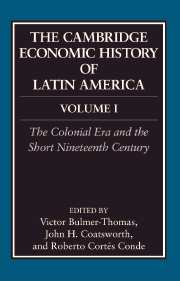Book contents
- Frontmatter
- Introduction
- Part I The Economic Background
- Part II Natural Resources and Factor Endowments
- 4 Land Use and the Transformation of the Environment
- 5 The Demographic Impact of Colonization
- 6 Labor Systems
- Part III Economic Organization and Sectoral Performance
- Part IV The Economic Impact of Independence
- Bibliographical Essays
- Index
- References
6 - Labor Systems
from Part II - Natural Resources and Factor Endowments
Published online by Cambridge University Press: 28 March 2008
- Frontmatter
- Introduction
- Part I The Economic Background
- Part II Natural Resources and Factor Endowments
- 4 Land Use and the Transformation of the Environment
- 5 The Demographic Impact of Colonization
- 6 Labor Systems
- Part III Economic Organization and Sectoral Performance
- Part IV The Economic Impact of Independence
- Bibliographical Essays
- Index
- References
Summary
Historians have long recognized that the development and transformation of labor systems played a key role in Iberian expansion to the New World, with long-term effects on postcolonial Latin American economies, societies, and cultures. Much of the modern analytical literature hinges on particular understandings of the nexus between labor supply and colonial extraction, often underscoring the importance of extraeconomic coercion as a necessary condition for the large-scale transfer of economic surplus from the Americas to Europe. Over the past quarter century, however, serious challenges to earlier dependency, modes-of-production, and world-systems approaches have introduced a considerable shift in focus, revealing an increasingly diverse agenda of issues and evidence. The new composite picture that emerges, although far from denying the significance of colonial extraction or of extraeconomic coercion in shaping labor arrangements, sheds light on complex regional systems enveloping distinct practices and institutions, whose overlapping and interconnected existence lays to rest the conventional schema of a linear, evolutionary sequence from early forms of compulsory service to a full-fledged wage labor market.
In redirecting attention to local, regional, and interregional labor and commodity markets, current historiographical trends have introduced important new perspectives on the factors determining patterns of labor recruitment and management. Differences in indigenous social structures, political institutions, and cultural practices constitute an important staring point. Not only did precolonial institutions in many cases play a central role in shaping distinct outcomes, but also postconquest transformations within indigenous polities and societies placed constraints on entrepreneurial options and influenced colonial institutional development. Population change was an important part of this panorama, first through the more obvious effects that the demographic collapse had on the labor supply, and subsequently through patterns of forced and voluntary migration, which have been the subject of a growing number of studies.
- Type
- Chapter
- Information
- The Cambridge Economic History of Latin America , pp. 185 - 234Publisher: Cambridge University PressPrint publication year: 2005
References
- 3
- Cited by

